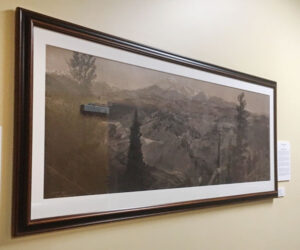By Martha Quillen
Welcome to modern America, a place where citizens are divided by culture, faith, class, and ethnicity, yet are thoroughly connected by government, the Internet, social media, and often in their daily lives. But in recent decades, partisan rifts have grown, and today our politics are as fraught as they were during ‘Nam – even though marijuana is legal and nobody’s getting drafted.
The good news is that partisan political players seem to have defeated apathy and indifference. The bad news is that partisan political players seem to have defeated apathy and indifference. What I wouldn’t give for those days when Jay Leno wandered around Hollywood asking people “Who’s the President of the United States,” and only half of them knew.
Those were the days, weren’t they? Days when you could spend a week in the wilderness disconnected from all media sources without any new political speech, Congressional stand-off, crazy budget proposal or tactless tweet enraging civilization.
But the heightened anger in our country can’t and shouldn’t be ignored.
In the 1960s the causes for our fractures were much clearer. A younger generation didn’t want to follow in their parents’ footsteps and go to war, especially since the reasons for the war in Vietnam didn’t make sense to them. And that split inspired a youth movement that questioned all of the conventions of its predecessors, including segregation, patriarchal notions, Puritanism, Protestantism and capitalism.
At the moment, Americans are broken into two primary camps. One preaches inclusion and multiculturalism but has little understanding or empathy for the other side (which comprises about half of Americans). The other side advocates personal liberties, but wants to control everyone’s moral choices and sex lives. If those citizens directed their disgust at the president or congress, campaigns might improve, since our leaders concoct such provocative platforms.
But Americans tend to rail at their fellow citizens, instead. And the idea of using persuasion? Measured arguments? Or civilized debate? Well, who’s listening?
Hostile arguments get heard, but being heard doesn’t resolve anything if people’s complaints are about who they hate rather than about policies. Democracy allows people to change their governments, but not one another.
Yet that’s what many Americans seem to want, and they’re trying to change others by shutting down Planned Parenthood, berating football players who kneel, or insisting other people give up their religion, or join the modern world. And some are demanding laws against hate speech.
Nadine Strossen, a former ACLU President and author of “Hate: Why We Should Resist It With Free Speech, Not Censorship,” says censorship does more harm than good.
And Barack Obama agrees. He said, “The strongest weapon against hateful speech is not repression, it is more speech – the voices of tolerance that rally against bigotry.”
Noam Chomsky, a professor, linguist, and nationally-known peace activist who’s authored countless books on language and politics, calls out Obama for defending censorship. In a 2010 Supreme Court case, Humanitarian Law Project vs. the United States Department of Justice, the defendants were charged with giving advice to people on the terrorist watch list and their conviction was upheld, even though the advice was non-violent and involved bringing attention to Kurdish rights. President Obama claimed the law was far too important to compromise.
Chomsky, however, denounced not just that court decision, but the watch list itself as a threat to activists and free speech. Chomsky contends censorship is the wrong way to deal with hate groups, and cites European countries which outlaw Holocaust denial as an example. He points out that every time someone breaks those laws it’s all over the front pages of European newspapers, which results in Nazi rallies and protests. Whereas in the United States where Holocaust denial is legal, it’s treated like theories that the earth is flat.
In regard to fascist groups, Chomsky says, “I don’t think you should try to shut them up forcefully, you should try to win the argument.” In a presentation available on YouTube, “Noam Chomsky – Best speech in 2018,” he claims the most important question facing us today is “whether organized human life will survive,” a concern Chomsky bases on nuclear proliferation and climate change.
I tend to regard apocalyptic warnings, whether they are issued by scientists or congregants, as dubious since humans have been predicting the imminent end of the world for thousands of years in order to get other people to do what they want. But today pretty much everyone agrees that our collective actions need serious revision. What people are having trouble deciding is which of our wicked ways needs to be tackled first: Excessive consumption, carbon production, warfare, profligacy, iniquity, racism, bullying, avarice, sloth, cruelty ….
Nuclear war and climate change aren’t our only problems. Human-generated environmental damage includes species loss, habitat loss and wildfires, which are happening right here in Colorado. Plastics and toxins are accumulating in our soil and water and damaging biosystems. Conventional warfare is also a threat, which results in the production of refugees and causes the fall of nation states, and that encourages terrorism, cartels and long-lasting feuds. For more problems read about the Anthropocene online, or watch PBS Digital Studio’s “The Sixth Extinction,” an amusing little tale of death and destruction.
Perhaps the biggest threat facing us today is our persistent animosity and disconnection with one another, and our tendency to dismiss other people’s concerns.
Candidates often reduce things to repetitious platitudes and promises, but issues are more complicated than campaigns indicate. For example: Yes, red regions are poorer than blue, but they likewise have much lower costs of living, so it isn’t stupid for working class Republicans to shun Democratic housing and medical policies that drive up prices. That leaves red state residents with less money and more reliance on jobs, which makes many of them reluctant to embrace environmentalism, globalism and new technology. Blue states are creating enormous gaps between the rich and poor, which increase homelessness and affluenza. Colorado is building a civilization in the wilderness that relies on conspicuous consumption, jet-setting and habitat loss. Surely policies would be better if we discussed more of these things.
Few people are more cynical about governments and power than Noam Chomsky. He views our wars in Korea, Vietnam, and Iraq as unjustified American invasions. Chomsky criticizes JFK, GW Bush, Obama and the Clintons, and regards Trump as a showman, distracting us with theatrics as he systematically destroys the agencies that serve and protect ordinary Americans so that billionaire businessmen like himself can profit. After Chomsky’s 2018 speech, students asked whether organized life can be saved, and Chomsky said yes, if they organized and spoke up.
In another lecture, Chomsky praised the United States for having uniquely strong free speech laws, which he explains weren’t guaranteed by the Bill of Rights, but were primarily established in court cases involving civil rights activists in the 1960s.
To be honest, I don’t have any idea whether our planet is doomed or fixable, but I think political issues need to be addressed far more comprehensively by all of us – presuming we want to avoid WWIII. And I’m clearly in good company with Strossen, Obama and Chomsky agreeing.
But actually addressing things comprehensively is easier said than done, and almost impossible given the present climate. Freedom isn’t something a government can just give us. It’s something we the citizens have to support, not just for ourselves, but for others, and comprehensive exchanges require that both sides get to speak. Peaceful discussion can only work if we approach issues not as wars to be won but as differences that can be worked out.
Quillen lives in Salida, which can be as contentious as other places, but airs its differences in a magnificently serene setting.



